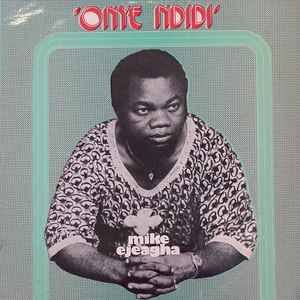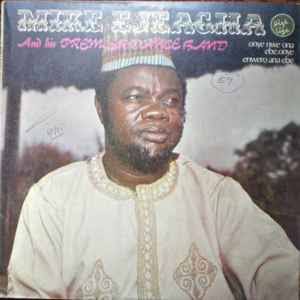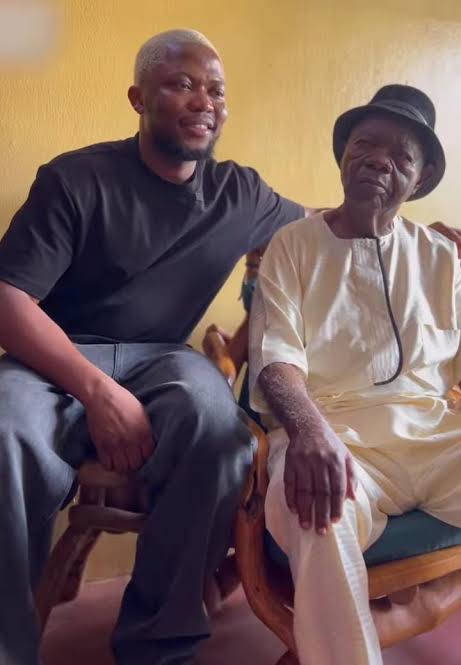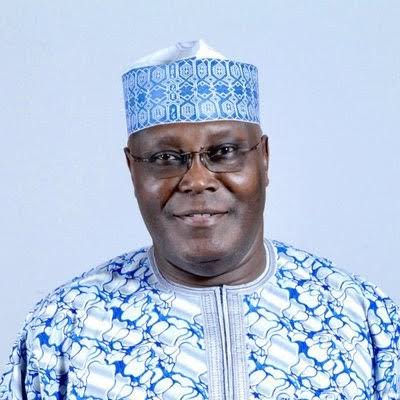For decades, Mike Ejeagha’s voice carried the soul of Igbo highlife music through the hills of Eastern Nigeria and beyond. Revered as a master storyteller, philosopher, and custodian of Igbo folklore, Ejeagha’s music was more than entertainment—it was a living archive of culture, wisdom, and identity.
Yet despite this towering legacy, much of his life was spent away from the spotlight, quietly nurturing a musical heritage few outside his community truly grasped.
His death on June 6, 2025, at the age of 95, reawakened interest in his vanished years and the legacy of a maestro whose gentle voice never demanded fame but earned enduring respect.
This feature explores the life and legacy of Mike Ejeagha, revealing the man behind the melodies and the complex cultural terrain he navigated for over seven decades.
Early Life: Roots in Rhythm and Storytelling
Growing up in the lush hills of Enugu, young Mike was surrounded by the rich traditions of Igbo life. The rhythmic clang of the ogene (metal gong), the deep beats of the ekwe (drum), and the haunting calls of folk songs filled the air. Music wasn’t merely art; it was the communal pulse, a language connecting ancestors and the present.
From an early age, Mike displayed a keen ear and a love for storytelling. “Music was the way we shared wisdom,” he would say in later interviews, reflecting on the oral tradition deeply embedded in Igbo culture. His stories were not just lyrics—they were lessons, history, warnings, and celebration.
At 15, Mike joined the Coal Camp Boys, a local band named after Enugu’s booming coal mining town, where workers would gather after long shifts to unwind with music and dance.
This formative experience exposed him to both traditional sounds and the growing influence of Western instruments, like the guitar, setting the stage for his unique fusion style.
Rise to Prominence: The Soundtrack of a Nation’s Birth

The year 1960 was electric in Nigeria — independence was declared, and a new national identity was being crafted. Into this moment stepped Mike Ejeagha, whose music captured the hopes and anxieties of the time. His band, Mike Ejeagha and the Merrymakers, began to perform widely, blending Igbo folk rhythms with highlife, a popular West African genre combining jazz, swing, and local sounds.
But it was his work on radio that truly amplified his voice. “Guitar Playtime,” his weekly program, was a beloved platform where he performed live, told stories, and shared folk wisdom. Radio was the internet of the day — the lifeline connecting distant communities.
His songs addressed everything from love and morality to politics and social issues. In a time of growing tensions, his music became a cultural glue.
When the Nigerian Civil War erupted in 1967, Mike’s art became even more poignant, chronicling the pain and resilience of the Igbo people.
The Vanished Years: Silence in the Shadows

After the 1970s, Mike Ejeagha’s public presence began to fade. While his peers gained fame and international recognition, Mike seemed to retreat from the spotlight. What happened?
Sources and interviews suggest several factors:
Changing Music Industry: The rise of new musical styles like Afrobeat and later Nigerian pop music reshaped public tastes. Traditional highlife and folk music found fewer mainstream platforms.
Personal Choice: Mike valued authenticity and often resisted commercial compromises. He once noted, “I make music to preserve my culture, not to chase fame.”
Limited Media Coverage: Nigeria’s evolving media landscape neglected older genres, focusing instead on newer, youth-driven sounds.
Despite the decline in public attention, Mike continued to create, performing locally and mentoring younger artists. He remained a guardian of Igbo oral tradition, quietly preserving the old songs and stories.
The Sudden Spotlight: Viral Revival and Cultural Rediscovery

In 2024, something remarkable happened. A decades-old song, “Ka Esi Le Onye Isi Oche,” with its catchy “Gwo Gwo Gwo Ngwo” chorus, caught fire on social media. Comedian Brain Jotter started a dance challenge that went viral on TikTok, Instagram, and Twitter.
Suddenly, young Nigerians were discovering the man behind the music. Online discussions praised Mike’s storytelling prowess and the timelessness of his rhythms. Music critics hailed this as a “highlife renaissance,” with Mike Ejeagha at its heart.
This revival wasn’t just nostalgia — it sparked deeper conversations about cultural preservation amid rapid modernization. Universities began including his songs in ethnomusicology courses.
Museums digitized his archives. Even government officials recognized his contributions, with Enugu State renaming a major road in his honor.
Musical Style: Storytelling as Legacy
Mike Ejeagha’s music was never about flashy solos or catchy hooks alone. It was storytelling in its purest form, blending folklore, morality, humor, and social commentary.
His lyrics are woven with Igbo proverbs — cryptic yet profound — inviting listeners to reflect on life, human nature, and society.
For example, in “Ka Esi Le Onye Isi Oche,” he narrates political intrigue and social dynamics through allegory, inviting listeners to decode the layers.
Instrumentally, he favored acoustic guitars, complemented by traditional percussion and subtle brass, giving his music an earthy, intimate feel — a bridge between the past and the present.
Legacy and Impact: The Maestro’s Quiet Revolution
Though his name may not have always been in the headlines, Mike Ejeagha’s impact runs deep.
Cultural Preservation: His recordings are some of the most comprehensive collections of Igbo folklore and traditional wisdom, now housed in the National Archives of Nigeria.
Influence on Artists: Contemporary Nigerian musicians, including highlife revivers and Afrobeat stars, cite Mike as a foundational influence. His dedication to storytelling inspired a generation to see music as a cultural tool, not just entertainment.
Education and Mentorship: Mike was also a teacher, often inviting younger musicians to learn not just the sounds but the stories behind the songs.
Reflections on a Passing: End of an Era
Mike Ejeagha passed away on June 6, 2025, at the age of 95, marking the end of a monumental chapter in Nigerian highlife and oral tradition.

Former Vice President Atiku Abubakar led tributes, describing Ejeagha as “a lyrical sage and living archive.”
In a widely shared post, Atiku praised the late icon’s deep storytelling and also commended skit maker Brain Jotter for recently honoring Ejeagha with the now-viral ‘Gwo Gwo Gwo Ngwo’ dance before his passing.
Across the South-East, Ejeagha’s passing triggered waves of remembrance. Cultural groups and heritage advocates celebrated his life’s work, which preserved proverbs, history, and moral lessons in song.
Though he departed quietly, Mike Ejeagha’s voice continues to echo — not just through vinyl records and digital streams, but in the collective memory of a people whose language and values he immortalized in music.
Closing Reflections: More Than Music — A Cultural Time Capsule
Mike Ejeagha’s story is one of a man who lived through Nigeria’s most turbulent times and emerged not just as a musician but as a custodian of culture.
His vanished years symbolize the sacrifices made to preserve heritage amid chaos, and his sudden spotlight reminds us that true art never dies.
As Nigeria and the world reflect on his contributions, Ejeagha’s music endures as a time capsule—a gateway into the values, struggles, and spirit of the Igbo people.
His quiet passing calls for a louder conversation on the preservation of indigenous arts and the respect owed to those who carry them.













Leave a comment